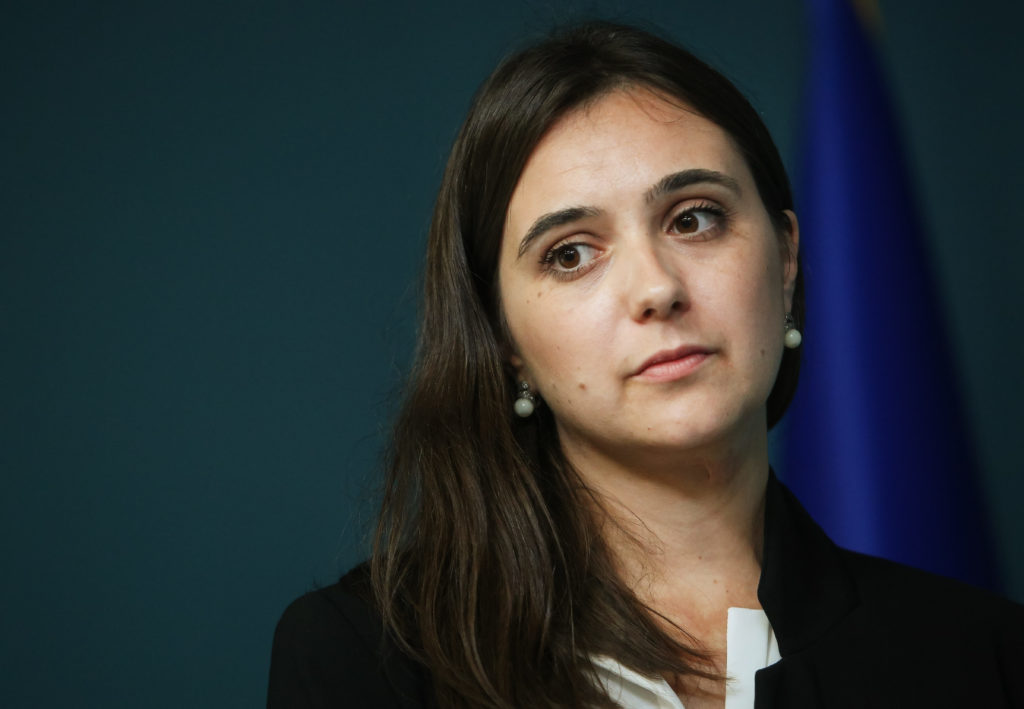KYIV
Ukrainian President Volodymyr Zelensky’s press secretary has reopened a highly divisive debate over the use of the Russian language in the country, saying that alongside Ukrainian – the country’s sole official language – there existed “Ukrainian Russian” as a fundamental part of national identity.
Yulia Mendel made her remarks as the deployment of additional Russian troops on Ukraine’s border boosted tensions and uncertainty with Moscow and they predictably sparked a firestorm of protests from both nationalists and liberals keen to defend the country’s interests.
“Russian, or to be more precise Ukrainian Russian, is part of our country’s cultural diversity. And Russian is not the exclusive property of Russia – not now or in the past,” Mendel said on the Dom television channel – which broadcasts in Russian to parts of eastern Ukraine which for seven years have been controlled by separatists beholden to Moscow.
“We have to de-monopolise the Russian language and say loud and clear that in Ukraine there is a Ukrainian Russian language.”
Similar comments have been made in recent weeks by interior Minister Arsen Avakov – a perennial political survivor in numerous cabinets despite alleged involvement in a number of scandals. But Mendel’s comments were given prominence because of her position as presidential press secretary.
“If you are talking about Ukrainian Russian, this is really about a Russian Ukraine,” countered opposition parliamentarian Volodymyr Vyatrovych.
Zelensky, a native Russian-speaker who has studiously used Ukrainian in his public dealings in office, has offered no comment on the latest debate. Zelensky is one of many in a line of Ukrainian leaders whose primary language was Russian and who later needed to hone their Ukrainian as part of political life. Now fugitive ex-President Victor Yanukovich was something of a target of derision among some Ukrainians for his often botched Ukrainian.
NEW LANGUAGE LAW
Ukrainian has been enshrined as the country’s sole “state language” since the collapse of Soviet rule, underpinned by a language law passed in 2019 which has provisions governing its use in technical documents, official statements, education and, most recently, in shops – where owners can be fined if they fail to serve customers in Ukrainian unless requested otherwise.
But in fact – especially in places like Kyiv – it is commonplace to hear people freely switch between the two slavic languages, or substitute Ukrainian words for Russian ones and vice-versa.
It is also common for television or other media to feature one person speaking in Russian while the other answers in Ukrainian, or vice-versa.
Ukrainian is similar in structure to Russian – but by no means identical – and Russians unfamiliar with it do not understand it.
Opinion surveys show most Ukrainians pay scant attention to the language issue and routinely use the two interchangeably. But prevalence of Ukrainian, once confined to the west of the county and derided as a “rural” language under tsars and Communists, has made inroads in Kyiv and elsewhere as part of a long-term strategy to entrench its use.
Some politicians reject any use of Russian as serving the interests of politicians friendly to Moscow and submitting to Russian propaganda on influential media, with Kremlin leader Vladimir Putin repeatedly vowing to defend Russian-speakers in parts of the former Soviet Union now outside Moscow’s control.
Some commentators suggested Mendel’s comments were aimed at marshalling support for the president in view of the current tensions over Russian troops movements and Moscow’s intentions.
TIMING OF A SENSITIVE ISSUE
But others said she had no business addressing such sensitive issues in a country still struggling to assert its identity 30 years after independence, seven years after losing Crimea to Russian annexation and now still enduring the blows of daily confrontations with pro-Moscow separatists in the east.
“The language issue is an issue of national security. No more, no less. The language sets the basis for the information environment.” commentator Serhiy Fursa wrote on the website nv.ua.
“And who establishes that information environment? Three guesses….The thought processes in a Russian-speaking environment are established by Russia, And they always will be. They have more resources. And if you remain in a Russian-speaking environment you will remain under Russian influence.”

